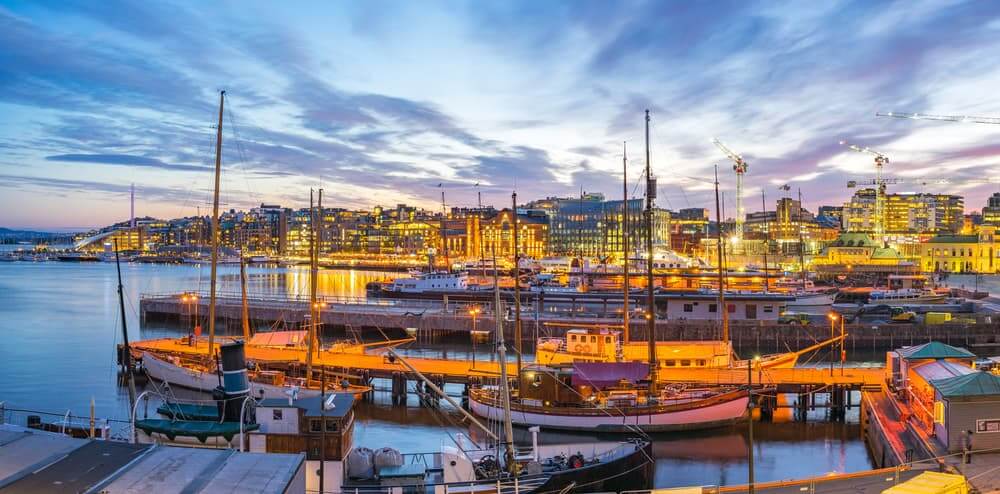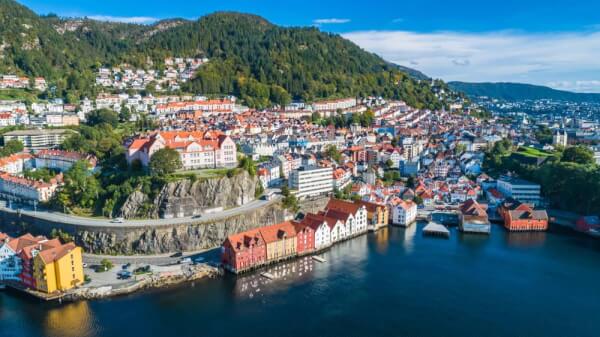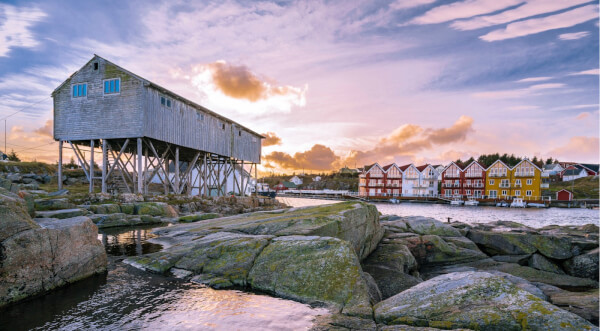How to order from Amazon in Norway
Planning a visit to the land of fjords and Northern Lights, or perhaps you're already a resident of Norway? Whether you're an expat or a local, thinking about...

It’s easy to see why so many expats choose to make Norway their home. This staggeringly beautiful country boasts dramatic mountain peaks, mysterious fjords, charming villages and some of the best winter sports in the world.
Norway also offers a high quality of life and one of the world’s best healthcare systems. Plus, most of the population speaks English, which really helps if you’re not fluent in Norwegian.
If you’re considering moving to Norway from the UK, read on. We’ve put together a handy guide covering everything you need to know to plan your move. This includes visas and residency permits, cost of living, property, healthcare and information for retirees too.
We’ll even throw in a handy tip for making low-cost international payments, which you’ll undoubtedly need to cover your relocation costs. Open a multi-currency account with Wise and you can send money between the UK, Norway and the rest of the world for just tiny fees and the real, mid-market exchange rate. This could save you a bundle, which you’ll be grateful for once you’ve read the cost of living in Norway section later in this guide.
But first, let’s focus on some of the basics you’ll need to know for your new life in Norway.
For starters, here are some useful facts about Norway, which you’ll need to know if you plan to live there:

Scandinavian countries are known to be more expensive than the UK and other parts of Europe, but what’s the cost of living like in Norway? It won’t surprise you to learn that prices are much higher there compared to the UK, especially for things like groceries and eating out at restaurants and bars.
But some things are roughly the same, such as public transport costs and average monthly utility bills. Plus, salaries in Norway are up to 32% higher than the UK.
To give you an idea of how much things cost in Norway, let’s take a look at a few examples:
| Cost in Norway | Cost in the UK | |
|---|---|---|
| Three-course meal for two people | £70 | £50 |
| Loaf of bread | £2.48 | £0.98 |
| Draught beer (0.5l) | £7.81 | £3.67 |
| Monthly public transport pass | £67 | £65 |
| Utilities - monthly | £143 | £155 |
If you’re planning to rent a home in Norway, you’ll find that monthly rental costs are around 13-17% higher than the UK - with more expensive properties for rent in city centres.
To buy a home, you can expect to pay up to 22% more per square metre (for an apartment) than in the UK.
The healthcare system in Norway is one of the best in the world, and the good news for expats is that you can access it as a non-citizen.
Once you’ve moved to Norway and registered as a resident (which you must do if you’re staying longer than three months), you can access Norwegian healthcare on the same basis as a citizen. However, you’ll need to be making contributions to Norway’s National Insurance Scheme, through employment or self-employment. You can find out more about how it works here.
Healthcare in Norway isn’t free, but it is subsidised by the state. You can also choose to take out private health insurance cover if you wish to.
Having a Norwegian bank account will definitely make life easier, especially when it comes to receiving a salary and covering your everyday expenses. But just how easy is it for non-citizens to open a bank account in Norway?
One of the most important things you’ll need is a Norwegian National Identity Number. You should get this when you receive your residence permit. You should also have your passport, recent photograph, proof of address and proof of employment (such as an employment contract) ready.
It could also be a good idea to contact your chosen bank in advance to find out the requirements for opening an account. Some of Norway’s largest banks are DnB, Nordea and Danske Bank - these could be good places to start.
Before you can start job hunting in Norway, you’ll need to sort your residence permit and get your Norwegian National Identity Number. But UK expats moving to Norway may find it tricky to get a job there, for a few different reasons.
To start with, although most of the population speaks English, fluency in Norwegian can make a big difference to your job prospects. And if you were interested in teaching English (which is often one of the best employment options for English speakers moving abroad), you may find competition for jobs fierce - and limited to the major cities.
However, you may have more luck if you are a skilled worker, are able to take on seasonal work or are qualified for a position in an industry where there is a shortage. Here are a few places to start your search for a job:
A popular option for newly arrived expats in Norway is to rent a property, rather than buy one. This gives you a roof over your head almost immediately, and also gives you time to get to know the local area before putting down permanent roots there.
Be aware that deposits for rentals tend to be quite high (up to three months upfront). You may also come across new terms for properties such as arehybel (studio apartment) and kollectiv (shared house).
If you want to buy a home in Norway, you shouldn’t face any restrictions as a non-citizen, although it’s usually quicker if you have a residence permit. But it definitely pays to research how the process of buying property works in Norway, as it can be a little different to the UK.
You can start your search for property to rent or buy in Norway on sites like Finn or Hybel.
Now that the UK has left the EU, the entry requirements for Norway have changed for British citizens.
UK passport holders don’t need a visitor’s visa to spend up to 90 days in a period of 180 days in Norway⁸. But if you are looking to move to Norway permanently, you’ll need a residence permit to stay longer than 90 days.
There are a few different types of residence permit for Norway. Here are a couple of the main options for UK citizens:
Family immigration⁹. You can apply for a family immigration residence permit if you have a family member or spouse who is a Norwegian citizen and lives in Norway, and you wish to move over to join them.
Work immigration¹⁰. If you don’t have a family connection to Norway, the best entry route is usually through employment. You can apply for a work immigration residence permit if you are a skilled worker, have a job offer or run your own business, or you plan to do seasonal work or participate in an exchange programme.
You may also be able to apply for a study permit, or apply for a permit as an AU pair. It’s worth taking a good look at the Directorate of Immigration (UDI) website for the full list of residence permit options.
Once you know which permit to apply for and check on the UDI website what supporting documents you’ll need, it’s time to get your application in. You can do this from the UK at either the VFS Centre in London or Edinburgh.
There’ll be an application fee to pay, then you’ll need to wait to see if you’ve been successful. Application processing times vary depending on the type of residence permit, but it normally takes around 3 months¹¹.
Dreaming of spending your post-work years in Norway? There are three key things you’ll need to know about as a retiree in Norway - entry requirements, pension arrangements and access to healthcare.
There isn’t a specific category of retirement visa for Norway. This means that if you want to live there as a retiree, you’ll need to follow the same entry route as any other UK citizen.
This makes it quite tricky, as the only available route unless you plan to work is a family immigration residence permit. If you don’t have family connections to Norway, retiring there from the UK may not be a possibility.
If you do manage to get yourself a residence permit for Norway, the next important thing to sort out is your pension income. You can apply to the International Pensions Centre to receive your UK state pension in Norway, and you may also be able to transfer over personal pensions.
A warning on this though. Unless you transfer your UK pension to a Norwegian scheme that is on HMRC’s list of Qualifying Recognised Overseas Pension Schemes (QROPS), you could face a large tax bill. And there aren’t many, if any, Norwegian providers on the current list¹². It could be a good idea to speak to an independent pensions adviser before you make any decisions, to help you find the most tax-efficient solution.
We’ve already looked at how expats will need to make National Insurance scheme contributions through employment in order to access healthcare services in Norway. But reassuringly, retirees are also eligible for state healthcare services once they become lawfully resident.
You will be registered for the National Insurance scheme once you move to Norway, and this will grant you access to healthcare provision.
If you need to send money to Norway ahead of your move, such as for residence permit fees or rental deposits, you can save money by using Wise.
Open a Wise multi-currency account and you can make international payments for low fees and the real, mid-market exchange rate.
If you need to receive money from the UK (such as your UK state pension, for example), you can use your Wise account to save on currency conversion fees and get the fairest exchange rate.
And while you’re waiting for your Norwegian bank account to be set up, you can spend like a local using your Wise debit card.
This clever contactless card automatically converts to the local currency, NOK in this case, at the mid-market rate whenever you spend. This means you don’t need to change money or carry cash around, and you can use your Wise card whenever you head back to the UK or go on holiday.
Join Wise and start saving today
So, there you have it - everything you need to know about moving to Norway from the UK. We’ve looked at residency permits, the healthcare system, finding a job, cost of living and much more. So, you should be all set to plan your big move. Good luck!
Sources used for this article:
Sources checked on 10th May-2021.
*Please see terms of use and product availability for your region or visit Wise fees and pricing for the most up to date pricing and fee information.
This publication is provided for general information purposes and does not constitute legal, tax or other professional advice from Wise Payments Limited or its subsidiaries and its affiliates, and it is not intended as a substitute for obtaining advice from a financial advisor or any other professional.
We make no representations, warranties or guarantees, whether expressed or implied, that the content in the publication is accurate, complete or up to date.

Planning a visit to the land of fjords and Northern Lights, or perhaps you're already a resident of Norway? Whether you're an expat or a local, thinking about...

Cost of living in Norway varies from region to region. This guide outlines what you can expect in terms of living costs.

Norway is a fantastic destination if you’re an expat looking to live and work abroad somewhere with friendly people, an interesting heritage, and awesome...

Looking for a new job? How about a chance to go to school in a completely new place? Ready to retire? Need some adventure in your life? Those are just a few...

Sometimes hailed as “the most liveable place on earth,” Norway is often coveted for it’s beautiful natural landscape, attracting hundreds of thousands of...

Almost 14% of the total population of Norway are immigrants, with one third travelling to Norway specifically to find work. Despite the notoriously high taxes...